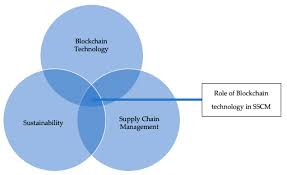Introduction
In a world increasingly focused on environmental responsibility, the intersection of blockchain technology and sustainable supply chains emerges as a powerful force for positive change. This article explores how blockchain is revolutionizing supply chains, fostering transparency, traceability, and accountability to promote sustainability.
Current Challenges in Supply Chains
Traditional supply chains often face challenges related to environmental impact, inefficiencies, and a lack of transparency. This section sets the stage by outlining the current issues in supply chains that blockchain aims to address.
How Blockchain Works
Understanding the basics of blockchain technology is crucial to grasp its impact on supply chains. Explore the decentralized and secure nature of blockchain, which forms the foundation for its applications in supply chain management.
Transparency in Supply Chains
One of the key benefits of blockchain is its ability to provide transparency throughout the supply chain. Learn how blockchain ensures real-time visibility, allowing consumers and stakeholders to track the journey of products from origin to destination.
Traceability and Accountability
Building on transparency, blockchain facilitates traceability and accountability. Discover how the technology enables the tracking of products at each stage of the supply chain, holding entities accountable for their environmental and ethical practices.
Smart Contracts for Sustainability
Smart contracts, self-executing agreements with the terms of the contract directly written into code, play a pivotal role in ensuring sustainability. Explore how blockchain automates and enforces sustainable practices through smart contracts.
Reduction of Fraud and Counterfeiting
Fraud and counterfeiting pose significant challenges in supply chains. Uncover how blockchain acts as a robust tool against fraudulent activities, ensuring the authenticity and integrity of products in the supply chain.
Decentralization and Fair Trade
Blockchain’s decentralized nature empowers small producers and promotes fair trade. Understand how blockchain eliminates the need for intermediaries, ensuring a more equitable distribution of profits in the supply chain.
Integration with IoT and Data Analytics
The synergy between blockchain, Internet of Things (IoT), and data analytics enhances sustainability efforts. Explore how real-time data-driven insights from IoT devices contribute to more informed decision-making in supply chains.
Industry Applications
Highlighting real-world examples, this section explores sectors such as food, fashion, and electronics that have embraced blockchain to enhance sustainability in their supply chains.
Regulatory Compliance
Navigating complex regulatory landscapes is a challenge for supply chains. Learn how blockchain can streamline regulatory compliance, providing a secure and transparent way to adhere to industry standards and regulations.
Cost and Efficiency Benefits
In addition to sustainability, blockchain adoption in supply chains offers economic advantages. Delve into the cost-saving and efficiency benefits that organizations can reap by embracing blockchain technology.
Challenges and Adoption Barriers
Despite its potential, blockchain faces challenges and adoption barriers. This section addresses concerns such as scalability, interoperability, and the need for industry-wide collaboration to unlock blockchain’s full potential.
Future Trends
Anticipate the future of blockchain in sustainable supply chains. Explore emerging trends and developments that are poised to further transform the landscape of supply chain management.
Conclusion
In conclusion, the marriage of blockchain and sustainable supply chains represents a paradigm shift in the way we produce, distribute, and consume goods. As blockchain continues to mature and gain widespread adoption, the potential for positive environmental and social impact in global supply chains becomes increasingly promising.
FAQs
- How does blockchain ensure transparency in supply chains?
- Blockchain provides real-time visibility by recording and verifying transactions at each stage of the supply chain, ensuring transparency for all stakeholders.
- What role do smart contracts play in sustainable supply chains?
- Smart contracts automate and enforce sustainable practices, ensuring that agreed-upon terms are executed without the need for intermediaries.
- How does blockchain reduce fraud and counterfeiting in supply chains?
- Blockchain’s decentralized and secure nature makes it difficult for fraudulent activities, ensuring the authenticity and integrity of products in the supply chain.
- What are some industry applications of blockchain in sustainable supply chains?
- Sectors like food, fashion, and electronics have embraced blockchain to enhance sustainability by ensuring transparency, traceability, and accountability.
- What are the economic benefits of adopting blockchain in supply chains?
- Blockchain adoption offers economic advantages such as cost savings and efficiency improvements by streamlining processes and eliminating the need for intermediaries.

